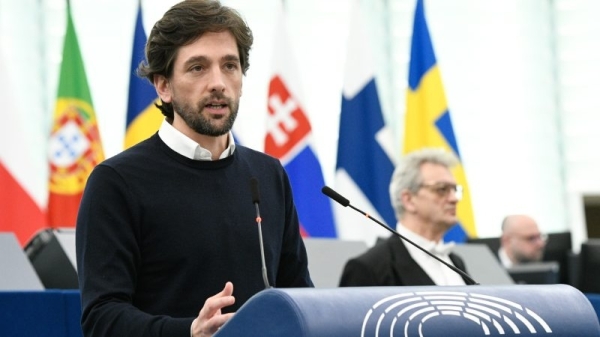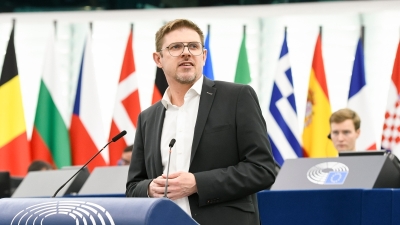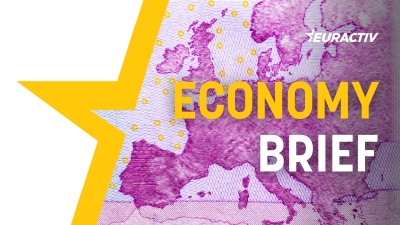MEPs vote to allow compulsory licensing of patented drugs in emergency situations

During the European Parliament’s plenary session on Wednesday (13 March), MEPs adopted their position on a law which could enable companies to produce medicines without the consent of the patent holder in crisis situations.
Allowing compulsory licensing within the EU and across borders in the event of a crisis, such as a pandemic, would ensure availability of critical products in all member states.
A total of 484 MEPs voted for the Parliament’s negotiating position, while 121 voted against and 20 abstained.
During the plenary debate prior to the vote, liberal Spanish MEP and rapporteur on the file Adrián Vázquez Lázara highlighted that the file is “a clear response to our responsibilities, especially in the case of situations such as the Covid-19 crisis”.
“It is important for governments and industry to have a legal recourse when we need to take these kinds of steps. Voluntary agreements and voluntary licensing should always be the first option to accelerate production and distribution of goods under critical times,” said Lázara, emphasising public-private cooperation during the recent pandemic.
He also added that with every member state having individual rules on compulsory licensing, the use can lead to great fragmentation.
“We try to harmonise these 27 mechanisms, so we have supply across borders. And we may never use this mechanism. But its existence is definitely very important if required,” Lázara continued.
How exactly this would work, remains to be determined as it would be decided in interinstitutional agreements with the Council.
The Parliament position suggests that the procedure is launched by the Commission during a declared emergency, following the identification of all patent holders of a particular product, accompanied by a recommendation from an advisory body.
If a company is subject to compulsory licensing, the Parliament supports the option of remuneration for the use of the patent.
The regulation on compulsory licensing for crisis management was proposed by the EU Commission in April 2023. The rules would go beyond cross-border health crises, and could be invoked in a range of different crisis situations.
Backlash
However, the proposal has met criticism.
Lázara himself has questioned the Commission proposal, including the lack of clarity regarding the definition of a crisis, the inclusion of know-how and trade secrets, the governance structure of a potential advisory body and how to calculate remuneration for patent holders subject to a compulsory licence.
Unsurprisingly, the European Federation of Pharmaceutical Industries and Associations (EFPIA) has not been entirely happy with the file.
In a statement following the Commission’s 2023 presentation, EFPIA director general Nathalie Moll said that “the introduction of compulsory licensing at the EU level would promulgate the perception of companies and investors that Europe’s intellectual property framework is not predictable or stable.”
“Compulsory licensing also undermines the innovation that we need when a health crisis arises,” Moll continued.
On the other hand, left-wing groups and civil society organisations have urged the inclusion of the option to allow for the export of products produced under a future EU compulsory licence to non-EU countries.
“It’s important that this instrument exists and the fragmented system in the European Union is harmonised. So much for the good intentions, but maintaining a prohibition of exports means that we’re actually making the wrong conclusion from the pandemic,” said German MEP Helmut Scholz from The Left during the debate ahead of Wednesday’s vote.
“The current proposal aims to secure health care for European Union citizens and means a Europe first. But this logic is leading us in the wrong direction. International solidarity and cooperation in times of crisis should not only be part of soapbox speeches, but must be reflected in an instrument like this,” Scholz added.
Scholz was the lead MEP on the Parliament’s trade committee opinion on the file, which had proposed a number of amendments suggesting that exports be allowed under certain conditions. These were rejected by the plenary.
Last week 70 civil society organisations signed a letter against the export ban.
“The COVID-19 pandemic has made clear that major health emergencies need to be addressed at local, national, regional and global level and showcased that the EU’s advanced industrial capacity can be used to help protect EU citizens while also aiding and supplying non-EU countries, aligning with the principle that “No one is safe until everyone is safe”, they wrote.
“It is therefore disheartening to note that, when preparing for the next crisis, the EU risks turning its back on the rest of the world, including non-EU countries in Europe, with this compulsory license proposal,” the organisations continued.
Read more with Euractiv




